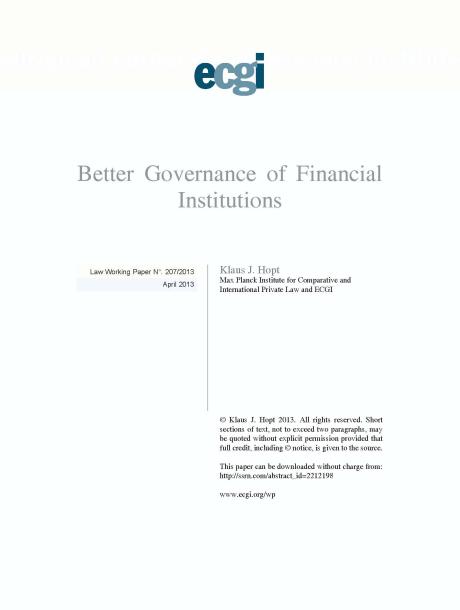
Better Governance of Financial Institutions
Abstract
Corporate governance of banks and other financial institutions differs considerably from general corporate governance. For financial institutions the scope of corporate governance goes beyond the shareholders (equity governance) to include debtholders, insurance policy holders and other creditors (debt governance). From the perspective of the supervision of financial institutions debt governance is the primary governance concern. Equity governance and debt governance face partly parallel and partly divergent interests of management, shareholders, debtholders and other creditors, and supervisors. Failures in the corporate governance of banks and other financial institutions contributed to the financial crisis. Corporate law reforms are less suited to achieve better governance of financial institutions, strengthening supervisory law requirements is more promising. Prominent proposals include clearer separation of the management and control function, possibly by a two-tier board as for Swiss and Belgian banks; establishment of a separate risk committee of the board or an independent chief risk officer; dealing with the problem of complex or opaque structure and organization; and group-wide corporate governance in single entities as well as in the group. Appropriate supervisory law requirements are needed for the internal procedures of banks and other financial institutions, specifically for risk management, internal control and compliance, and internal and external auditing. Supervisory fit and proper tests for the board, the management and major shareholders are useful. Qualification and experience of board members of banks and other financial institutions is more important than independence, though having a number of independent directors is useful. These and other requirements of the regulation and supervision of banks and other financial institutions concerning better governance are demanding and even severe, but necessary for regulated industries such as financial institutions. But the temptation to let them spill over indiscriminately to the corporate governance of the firm must be strictly resisted. This article analyses the economic, legal, and comparative research and covers the reforms by the European Commission, the European Banking Authority, CDR IV, and Solvency II up to the end of 2012.
Published in
“Corporate Governance of Banks after the Financial Crisis”, in: E. Wymeersch, K. J. Hopt, G. Ferrarini, eds., Financial Regulation and Supervision, A post-crisis analysis, Oxford University Press 2012, pp. 337-367 (Part A)






